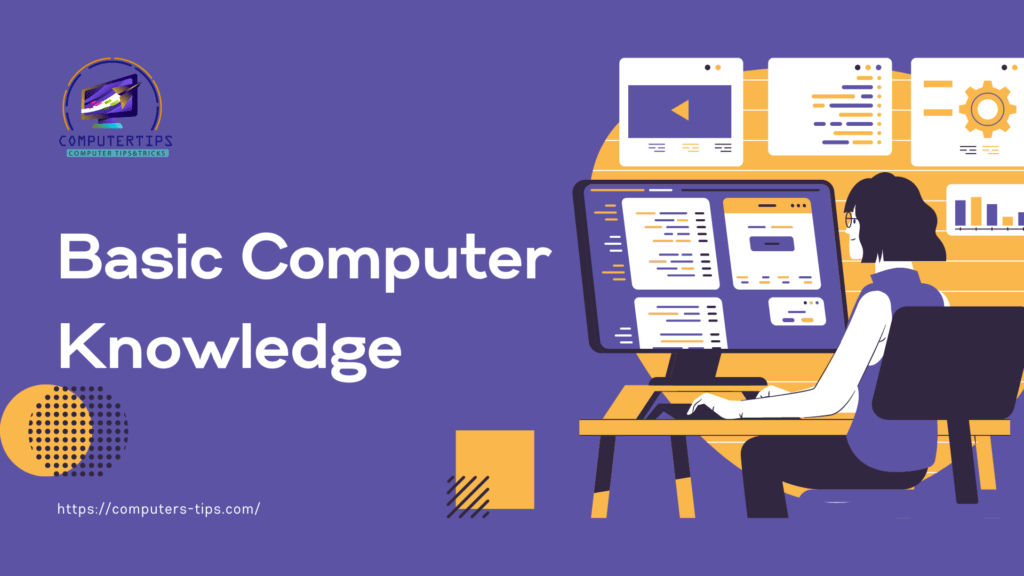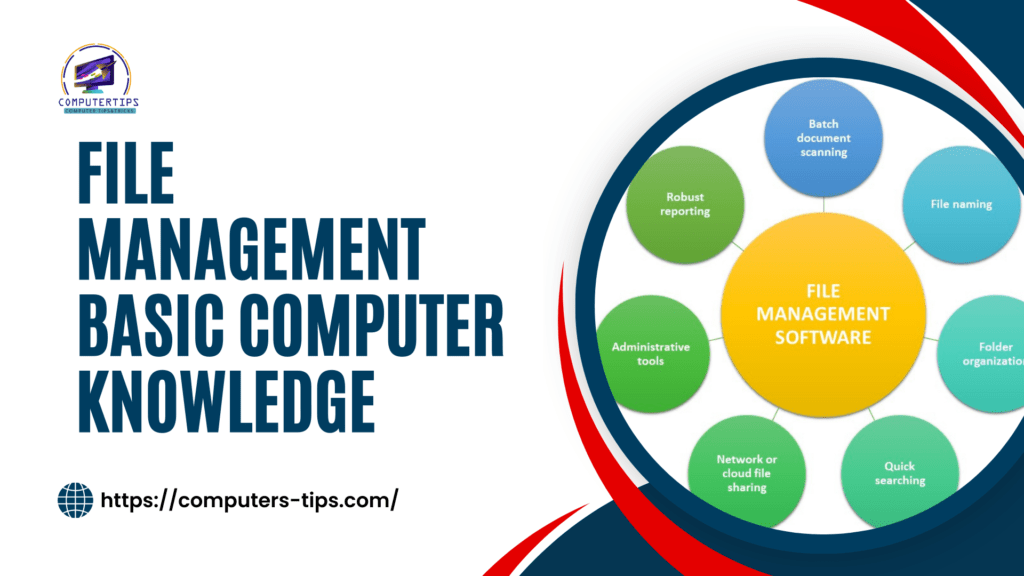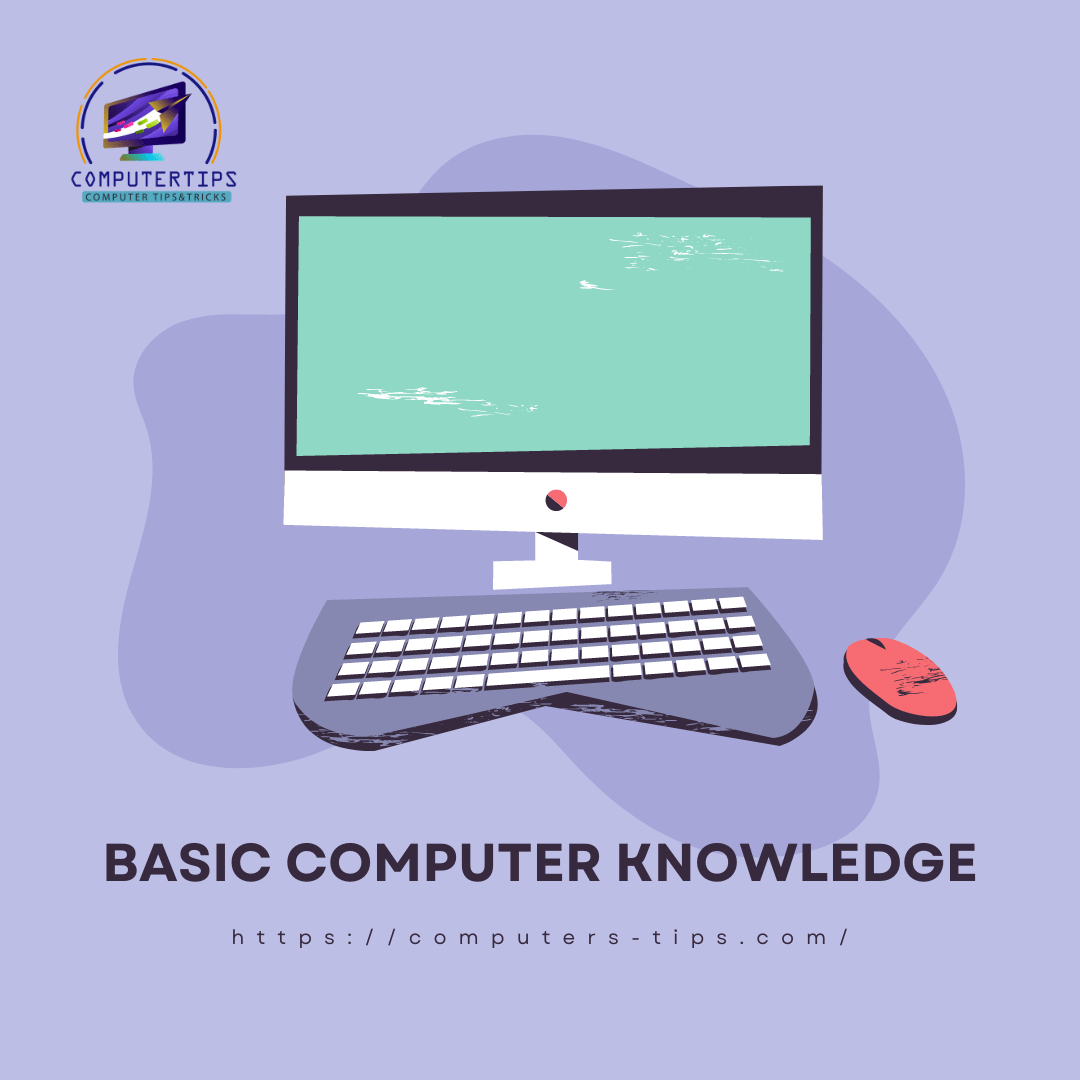Basic Computer Knowledge Embarking on a journey to acquire basic computer knowledge? This comprehensive guide will walk you through the fundamental steps, from understanding hardware and software to exploring essential digital skills.

Introduction Basic Computer Knowledge
Basic Computer Knowledge In today’s digitally-driven world, basic computer knowledge is no longer a luxury but a necessity. Whether you’re a student, a professional, a retiree, or anyone in between, having a solid grasp of computer basics can significantly enhance your efficiency and confidence in navigating the modern world.
1. Understanding Computer Hardware Basic Computer Knowledge
The first step in acquiring basic computer knowledge is familiarizing yourself with the hardware components of a computer system. Learn about the central processing unit (CPU), memory (RAM), storage devices (hard drives and SSDs), input and output devices (keyboard, mouse, monitor), and more. Understanding these components will help you comprehend how data is processed and stored within a computer.
2. Exploring Operating Systems Basic Computer Knowledge
An operating system (OS) is the software that manages computer hardware and software resources and provides various services for computer programs. Standard operating systems include Windows, macOS, and Linux. Explore an OS’s interface, navigation, and basic functions to become comfortable with interacting with your computer.
3. Navigating Software Applications Basic Computer Knowledge
Software applications are programs designed to perform specific tasks on a computer. Familiarize yourself with typical software applications such as word processors, web browsers, email clients, and media players. Learn how to open, use, and close these applications effectively.
4. Basic Computer Skills Basic Computer Knowledge
Mastering basic computer skills is essential. Learn how to perform tasks such as creating, saving, and organizing files and folders. Gain proficiency in copy and paste, keyboard shortcuts, and understanding file formats. These skills are the foundation for more advanced tasks.
5. Internet and Online Safety Basic Computer Knowledge
As you dive into the digital world, understanding internet basics and online safety is paramount. Learn how to browse the internet, search for information, and evaluate the credibility of online sources. Additionally, educate yourself about cybersecurity best practices, including creating strong passwords and recognizing phishing attempts.
6. File Management Basic Computer Knowledge

Efficiently managing files and folders is a crucial skill. Organize your documents, photos, and other files systematically. Learn how to rename, move, and delete files, ensuring you can quickly locate and access your digital assets.
7. Basic Troubleshooting Basic Computer Knowledge
Encountering technical issues is inevitable, but knowing how to troubleshoot common problems can save you a lot of frustration. Learn how to restart your computer, troubleshoot software glitches, and address minor hardware issues.
8. Continuing Education Basic Computer Knowledge
Basic computer knowledge is just the beginning. As you become more comfortable with the fundamentals, consider exploring more advanced topics like programming, data analysis, and digital design. Numerous online resources, courses, and tutorials are available to help you expand your skills.
FAQs
1. I’m entirely new to computers. Where should I start?
Start by familiarizing yourself with the basic hardware components of a computer, such as the CPU, memory, and storage devices. Then, explore the operating system and basic software applications like word processors and web browsers.
2. What is an operating system, and why is it important?
An operating system (OS) is software that manages computer hardware and software resources. It provides a user interface and controls the computer’s functions. Understanding your OS is crucial for navigating your computer effectively.
3. How can I improve my typing skills?
Practice is key. There are various typing tutor programs available online that can help you improve your typing speed and accuracy. A consistent approach will gradually enhance your skills.
4. What are keyboard shortcuts, and why should I learn them?
Keyboard shortcuts are key combinations that perform specific tasks quickly. Learning shortcuts can significantly boost your efficiency while using software applications and navigating your computer.
5. How do I stay safe while using the internet?
Prioritize online safety by using strong, unique passwords for each account, being cautious of suspicious emails or links, and regularly updating your software and antivirus programs. Avoid sharing personal information online.
6. What’s the difference between a file and a folder?
A file is a digital document, image, or piece of data, while a folder is a container used to organize and store multiple files. Think of a folder as a virtual filing cabinet that helps you keep your files organized.
7. How do I troubleshoot common computer issues?
For minor problems, try restarting your computer. If a specific software application is acting up, consider reinstalling it. For more complex issues, seek online forums, tutorials, or professional assistance.
8. Are there resources for learning more advanced computer skills?
Absolutely! There are countless online resources, tutorials, and courses available. Websites like Coursera, Udemy, and Khan Academy offer a wide range of courses on programming, data analysis, graphic design, and more.
Conclusion
Embarking on the journey to acquire basic computer knowledge is a rewarding endeavor that opens doors to endless possibilities in the digital realm. By understanding computer hardware, exploring operating systems and software applications, mastering essential skills, and prioritizing online safety, you’ll lay a strong foundation for confidently navigating the technology-driven world.
